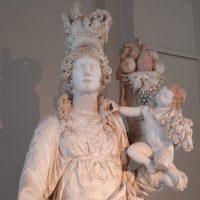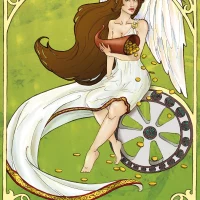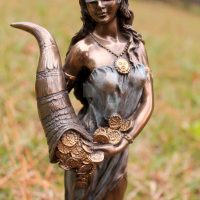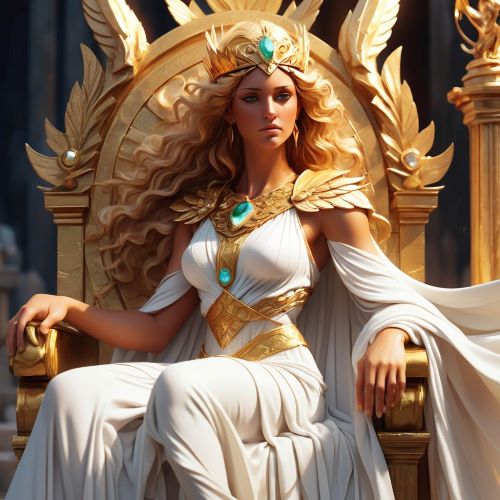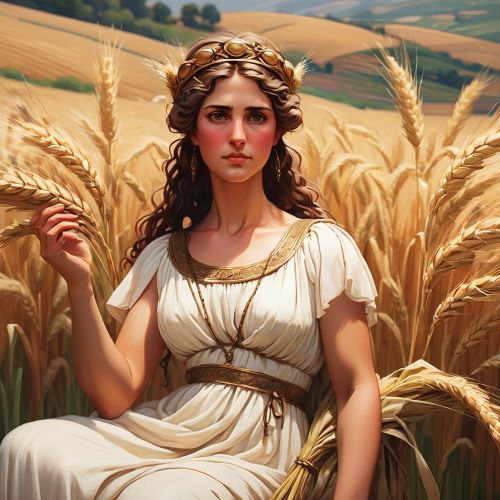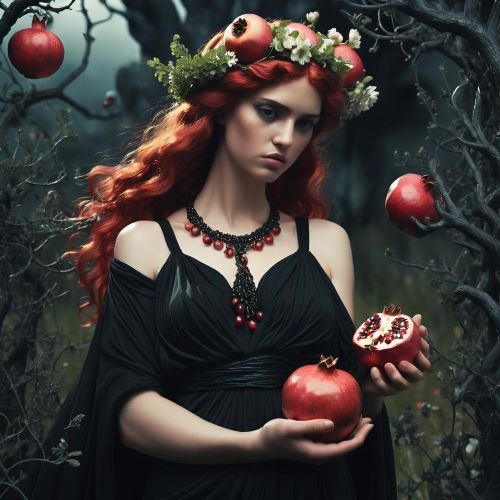Tyche : Goddess of Fortune
Listen
At a glance
| Description | |
|---|---|
| Origin | Greek Mythology |
| Classification | Gods |
| Family Members | Oceanus (Father), Tethys (Mother) |
| Region | Greece |
| Associated With | Fortune, Wealth, Prosperity |
Tyche
Introduction
Tyche, a central figure in Greek mythology, embodied the essence of fortune, chance, providence, and fate. Typically portrayed as a fair-skinned woman adorned with a mural crown, she carried symbolic objects such as a cornucopia, rudder, or wheel. Her depiction with the wheel particularly emphasized the ever-changing and unpredictable nature of luck and destiny. From the individual fortunes of people to the destinies of entire cities and civilizations, Tyche’s influence pervaded every aspect of life. Unlike the deliberate actions of the Olympian gods and heroes, Tyche represented a force beyond control, orchestrating the unpredictable twists and turns of existence, bestowing both blessings and misfortunes with capricious abandon.
Physical Traits
Tyche’s depictions varied widely, yet each captured her essence as a graceful embodiment of prosperity and chance. Artists portrayed her with serene beauty, reflecting the mysterious allure of fortune. Central to her imagery was the wheel, symbolizing luck’s cyclical nature, alongside the cornucopia, brimming with abundance. These symbols embodied Tyche’s dual nature, capable of granting both blessings and misfortunes to mortals. Often depicted adorned with a mural crown, she symbolized protection over cities and towns, clutching the horn of plenty, or cornucopia, as a testament to her ability to bestow wealth and prosperity. Alternatively, she held a rudder, indicating her influence in steering the course of fate, or a wheel, representing fate’s unpredictability. While her physical representation varied, Tyche’s essence remained consistent in her portrayal as a regal figure, crowned and bearing symbols of her dominion over fortune’s whims.
Family
Tyche’s lineage remains veiled in ambiguity, a testament to the enigmatic nature of luck. According to Hesiod, she emerged as the offspring of the primordial titans Oceanus and Tethys, embodying the boundless expanse and unpredictability of the sea. Yet, conflicting narratives elevate her status to the daughter of Zeus, supreme ruler of the gods, showcasing the profound influence of fate even upon divine beings. Such diverse genealogies mirror the intricate complexities inherent within Tyche herself. In some tales, Tyche is hailed as the daughter of the Titans Oceanus and Tethys, aligning her with the essence of rivers and the Oceanids. However, alternate myths intertwine her origins with Zeus, the paramount deity, and Hera, the venerable queen of Olympus. Amidst these varied accounts, Tyche’s divine lineage underscores her pivotal role in shaping the destinies of mortals, regardless of her elusive ancestry.
Other names
Tyche’s influence transcended geographical and cultural boundaries, leading to various names and interpretations across civilizations. In Roman mythology, she was synonymous with Fortuna, the goddess governing fortune and fate. The Romans revered Fortuna in diverse aspects, from Fortuna Primigenia, associated with the bounty of first fruits, to Fortuna Redux, overseeing safe returns. Similarly, outside Greece, Tyche found resonance in Hellenistic Egypt as Tyche-Isis, amalgamating Greek and Egyptian belief systems. Beyond these, Tyche assumed other identities, including Nemesis, the goddess of retribution, and Agathos Daimon, the deity of personal luck. Throughout the Greek world, she acquired epithets such as “Eutychia” for good fortune and “Aporia” for misfortune. Cities vying for her favor bestowed titles like “Poliouchos” (city guardian) and “Tychaion Euteria” (bestower of bountiful harvests). These varied appellations underscore Tyche’s enduring presence and universal significance in human consciousness.
Powers and Abilities
Tyche, the goddess of fortune and fate, held sway over the destinies of mortals with an authority that knew no bounds. Her influence, though potent, was marked by an enigmatic unpredictability. Capable of bestowing wealth, success, and happiness upon those she favored, Tyche could just as easily bring about ruin and despair to those who fell out of her favor. This duality of her nature underscored the capriciousness inherent in the concept of luck, serving as a constant reminder of life’s impermanence.
At the heart of Tyche’s iconography lay the symbolism of the spinning wheel, representing the perpetual flux of fate. Individuals and societies alike found themselves subject to its unpredictable revolutions, with fortunes rising and falling with each turn. Tyche’s association with the wheel encapsulated the ever-changing nature of destiny, where triumph and tribulation coexisted in a perpetual dance of chance.
Despite her immense power, Tyche was often depicted with attributes that emphasized impartiality, such as being portrayed as blind. This symbolism underscored the notion that she favored no one, dispensing her gifts and punishments without bias or prejudice. In some philosophical interpretations, particularly among the Stoics, Tyche was viewed as an impersonal force governing the randomness of the universe. In this conceptualization, she transcended notions of morality, existing as a fundamental aspect of existence itself.
In her role as the arbitress of fortune, Tyche’s influence extended beyond individual lives to shape the outcomes of significant events and historical epochs. From the rise and fall of empires to the outcomes of wars and elections, her hand could be discerned in the grand sweep of history. Tyche’s domain encompassed both the lofty realms of power and the mundane aspects of daily existence, serving as a potent reminder of the unpredictable nature of fate that governs all mortal endeavors.
Modern Day Influence
In modern society, Tyche’s influence permeates various facets of culture and everyday life. The concept of “Lady Luck” in popular culture directly descends from Tyche, often invoked in situations involving gambling or other instances where chance is prominent. The enduring symbol of the Wheel of Fortune, associated with Tyche, remains prevalent in literature and art, serving as a timeless representation of luck’s unpredictable nature.
Tyche’s presence endures through numerous references in literature, art, and media, embodying the eternal symbol of luck and chance. From the belief in lucky charms to phrases like “fortune favors the bold,” Tyche’s legacy persists in contemporary language and cultural expressions. The fascination with games of chance and fortune-telling further underscores humanity’s enduring captivation with the mysteries of luck.
Beyond ancient mythology, Tyche’s legacy extends into the realm of Roman mythology, where she is embodied in the goddess Fortuna. Lady Luck, a ubiquitous figure in modern culture, mirrors the unpredictable nature of fortune embodied by Tyche. From the adorned settings of casinos to proverbial expressions like “the wheel of fortune turns,” Tyche’s influence continues to shape our understanding of fate and chance.
Tyche’s presence also resonates in literature, inspiring writers to explore her unpredictable nature. Works such as Alexander Pope’s “An Essay on Man” and John Keats’ “Ode to Fortune” grapple with Tyche’s capriciousness, echoing her role as the arbiter of fate. In the realm of art, Tyche’s imagery endures through iconic paintings like Sandro Botticelli’s “Primavera,” depicting Fortuna as a blindfolded woman with a cornucopia and a wheel. Modern artists continue to draw inspiration from this imagery, symbolizing the whimsical nature of destiny.
Moreover, Tyche’s influence extends into psychology through the concept of “locus of control,” reflecting individuals’ beliefs regarding their control over destiny versus external forces. Through various mediums and disciplines, Tyche’s enigmatic presence serves as a poignant reminder of life’s unpredictability and the enduring element of chance.
Related Images
Frequently Asked Questions
What is lorem Ipsum?
I am text block. Click edit button to change this text. Lorem ipsum dolor sit amet, consectetur adipiscing elit. Ut elit tellus, luctus nec ullamcorper mattis, pulvinar dapibus leo.
What is lorem Ipsum?
I am text block. Click edit button to change this text. Lorem ipsum dolor sit amet, consectetur adipiscing elit. Ut elit tellus, luctus nec ullamcorper mattis, pulvinar dapibus leo.
What is lorem Ipsum?
I am text block. Click edit button to change this text. Lorem ipsum dolor sit amet, consectetur adipiscing elit. Ut elit tellus, luctus nec ullamcorper mattis, pulvinar dapibus leo.
What is lorem Ipsum?
I am text block. Click edit button to change this text. Lorem ipsum dolor sit amet, consectetur adipiscing elit. Ut elit tellus, luctus nec ullamcorper mattis, pulvinar dapibus leo.
What is lorem Ipsum?
I am text block. Click edit button to change this text. Lorem ipsum dolor sit amet, consectetur adipiscing elit. Ut elit tellus, luctus nec ullamcorper mattis, pulvinar dapibus leo.


